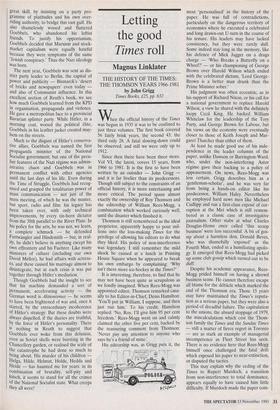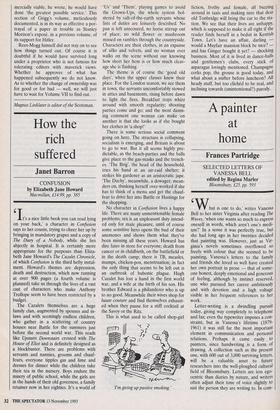Letting the good
Times roll
Magnus Linklater
THE HISTORY OF THE TIMES: THE THOMSON YEARS 1966-1981 by John Grigg Times Books, £25, pp. 632 hen the official history of the Times was begun in 1935 it was to be confined to just three volumes. The first book covered 56 fairly brisk years, the second 43, the third only 28. A fatal slowing-down could be observed, and still we were only up to 1912.
Since then there have been three more. Vol VI, the latest, covers 15 years, from 1966 to 1981. It is the first to have been written by an outsider — John Grigg — and it is far livelier than its predecessors. Though still subject to the constraints of an official history, it is more entertaining and more critical. The period spans almost exactly the ownership of Roy Thomson and the editorship of William. Rees-Mogg, a combination which worked curiously well, until the disaster which finished it.
Thomson is still remembered as the ideal proprietor, apparently happy to pour mil- lions into the loss-making Times for the privilege of allowing his editors to do what they liked. His policy of non-interference was legendary. I still remember the mild shock he caused at a lunch in Printing House Square when he appeared to break his own embargo by complaining: 'Why isn't there more ice-hockey in the Times?'
It is interesting, therefore, to find that he may not have been quite as scrupulous as we fondly imagined. When Rees-Mogg was appointed editor, Thomson remarked casu- ally to his Editor-in-Chief, Denis Hamilton: 'You'll put in William, I suppose, and then just run him.' To his credit, Hamilton replied: 'No, Roy, I'll give him 95 per cent freedom.' Rees-Mogg went on and calmly claimed the other five per cent, backed by the reassuring comment from Thomson: 'Never pay any attention to anyone who says he's a friend of mine.'
His editorship was, as Griggputs it, the
most 'personalised' in the history of the paper. He was full of contradictions, particularly on the dangerous territory of economics where he executed a celebrated and long drawn-out U-turn in the course of his tenure. His leaders may have lacked consistency, but they were rarely dull. Some indeed stay long in the memory, like his defence of Mick Jagger on a drugs charge — 'Who Breaks a Butterfly on a Wheel?' — or his championing of George Brown over Harold Wilson which ended with the celebrated dictum, 'Lord George- Brown is a better man drunk than the Prime Minister sober.'
His judgment was often eccentric, as in his support of Richard Nixon, or his call for a national government to replace Harold Wilson, a view he shared with the definitely loopy Cecil King. He backed William Whitelaw for the leadership of the Tory Party, and George Brown for Labour, but his views on the economy were eventually closer to those of Keith Joseph and Mar- garet Thatcher than either of them.
At least he made good use of his inde- pendence in the leader columns of the paper, unlike Dawson or Barrington-Ward, who, under the non-interfering Astor regime gave their backing to a policy of appeasement. On news, Rees-Mogg was less certain. Grigg describes him as a 'gentleman-scholar', and he was very far from being a hands-on editor like his predecessor, William Haley. Nevertheless he employed hard news men like Michael Cudlipp and ran a first-class exposé of cor- ruption at the Met which is still remem- bered as a classic case of investigative journalism. Other stabs at what Charles Douglas-Home once called 'this scoop business' were less successful. A bit of gos- sip about a harmless don, Donald Beves, who was shamefully 'exposed' as the Fourth Man, ended in a humiliating apolo- gy. It emerged that Rees-Mogg had picked up some club gossip which turned out to be dtiff.
Despite his academic appearance, Rees- Mogg prided himself on having a shrewd business sense. He cannot therefore escape all blame for the debacle which marked the end of the Thomson era. Those 15 years may have maintained the Times's reputa- tion as a serious paper, but they were also a period of dreadful failure. The capitulation to the unions, the absurd stoppage of 1979, the miscalculations which cost the Thom- son family the Times and the Sunday Times
— still a matter of fierce regret in Toronto — are as stark an example of managerial incompetence as Fleet Street has seen. There is no evidence here that Rees-Mogg himself once challenged the fatal drift which exposed his paper to near-extinction, or disputed the tactics.
This may explain why the ceding of the Times to Rupert Murdoch, a transition from non-interference to total dominance, appears equally to have caused him little difficulty. If Murdoch made the paper corn-
mercially viable, he wrote, he would have done 'the greatest possible service.' This section of Grigg's volume, meticulously documented, is in its way as effective a por- trayal of a paper in trouble as Stanley Morison's exposé, in a previous volume, of its support for Hitler.
Rees-Mogg himself did not stay on to see how things turned out. Of course it is doubtful if he would have survived long under a proprietor who is not famous for tolerating editors with maverick views. Whether he approves of what has happened subsequently we do not know. As to whether the change of ownership was for good or for bad — well, we will just have to wait for Volume VII to find out.
Magnus Linklater is editor of the Scotsman.



























































 Previous page
Previous page